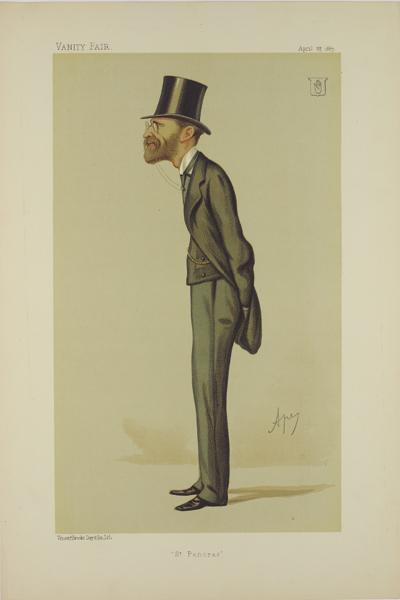Goldsmid, Sir Julian
Address: 49 Grosvenor Sq (see notes), London
Occupation: MP, JP & Landowner, LIBERAL CANDIDATE
Witness Type: Candidate / MP
Party: Liberal
Paid To:
Sir Julian Goldsmid was 42 at the time of the by-election. Having lost his seat as the MP for Rochester in the earlier 1880 General Election, he decided to contest the Sandwich seat. When he lost the contest following sustained and systematic bribery, he successfully petitioned to have the result overturned and the Borough was disenfranchised until 1885.
He was named on the Petition as Sir Julian Goldsmid, Baronet of 105 Piccadilly.
Julian Goldsmid was born on 2nd October 1838 at Marylebone, Middlesex, England, the eldest son of Frederick Goldsmid MP and Caroline Goldsmid nee Samuel.
He passed away, aged 57 years, on 17th January 1896 in Brighton, Sussex, England.[3] Upon his death, the English baronetcy expired. The Portuguese title was conveyed to his eldest daughter, Violet, in 1906.
Wikipedia Sir Julian Goldsmid, 3rd Baronet
Sir Julian Goldsmid 3rd Baronet was a British Lawyer and businessman and Liberal politician who sat in the House of Commons between 1866 and 1896 he was the son of Frederick Goldsmid and Caroline Samuel his father was a banker and Member of Parliament for Honiton Educated at the University College, London and was also called to the bar and after a brief period on the Oxford circuit he gave up practicing law when he was elected to parliament.
He first stood for Parliament ad a by-election in February 1864 for the borough of Brighton without success and was again defeated in the 1865 general election at Cirencester He was eventually elected unopposed as Member of Parliament for Honiton at a by-election in March 1866. In that year he inherited Somerhill House near Tonbridge in Kent when his father died.
He married Virginia Philipson in 1868. They had eight daughters, including:
Violet Goldsmid (1869?–1949?)
Edith Goldsmid (1870–1955)
Margherita Goldsmid (1871–1825)
Beatrice Goldsmid (1873–1937)
Maud Goldsmid (1874–1965)
Honiton was disfranchised in 1868 by the Reform Act of 1867 and at the general election he stood unsuccessfully for Mid Surrey. He was elected for Rochester in 1870 and held the seat until his defeat in the 1880 general election.
He then contested and lost the by-election in May 1880 for Sandwich and was returned to the Commons after a five-year absence at the 1885 general election as MP for Pancras South holding that seat until his death in 1896. In 1894 he was deputy speaker of the House of Commons
In 1878 he succeeded his uncle Sir Francis Goldsmid to the baronetcy and to the estate of Whiteknights Park at Earley in Berkshire, as well as others in Sussex, Kent and other places. He also bore the Portugeuse title of Baron de Goldsmid e de Palmeira His business interests included being chairman of the Submarine Telegraph Company and the Imperial and Continental Gas Association and was a director of the London, Brighton and South Coast Railway a steam locomotive was named Goldsmid after him in 1892 He was also treasurer of University College in 1880/1 and a member of the council of University College Hospital and a member of the council there.
In 1879 Goldsmid began expanding Somerhill to accommodate his large family he had eight daughters the work was completed in 1897.
He was vice-chancellor of the University of London when he died Also the Deputy Lieutenant of Kent, Sussex and Berkshire J.P FOR Kent, Sussrx and London Colonel of the 1st Sussex Rifle Volunteers and the honorary colonel of the 1st Sussex Artillery Volunteers
He died at the age of 57 at Brighton where his grandfather Sir Issac Goldsmid had purchased the Wick Estate in 1830. Julian Road in Hove is named after him.

